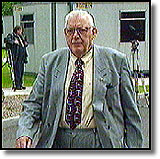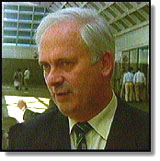
|
Positive Signs For All-Party TalksAll-Party talks over Northern Ireland could be on the way. There has been widespread, if cautious, support for the Prime Minister's proposals on terrorist weapons in the province.The plan - which has been agreed with the Irish government and will soon be explained in a Commons statement - would involve weapons being handed over while talks go ahead. In a series of meetings Mr Blair has spoken with Ulster Unionist leaders and secured a cautious acceptance of the plans. Only Ian Paisley's DUP have protested against the plans. John Hume, the leader of the nationalist SDLP, has said he hopes the IRA would respond with an "unequivocal" restoration of the ceasefire.
The Sinn Fein Party Chairman, Mitchell McLaughlin, told the BBC's Today programme that he hadn't seen the proposals, but that "we have acknowledged that the British government has begun to adress those issues which Sinn Fein thought were crucial to the peace process." Asked about an IRA ceasefire, Mr McLaughlin replied: "If the issues that have been presented to the British government are addressed, then we will have taken a giant step in that direction. I am fully confident about that." Mr Blair has only just returned from the G7 and Earth Summits where he made some progress regarding Northern Ireland. He garnered President Clinton's support for his approach and developed a plan with the Irish Premier John Bruton on decommissioning of arms. The issue is so high on his agenda that he met with Ulster Unionists as soon as he returned to London to discuss the issue. The Unionists' leader David Trimble said afterwards that he was not displeased by the plan. He added that a guarantee that paramilitaries would disarm in parallel with the talks was essential.
The consent of the Unionist party to the two governments' proposals is crucial to the peace process. If, once they have had a look at the detail, the main Nationalist party agrees, then multi-party talks could go ahead.
In recent talks with Sinn Fein, the Government told the republicans that talks could begin six weeks after the beginning of an unequivocal IRA ceasefire. Mr Blair is proposing that decommissioning takes place alongside talks: not beforehand, as Unionists wanted, and not afterwards as the paramilitaries had wanted. The process would be overseen by an international agency. Essentially there is still a gap between loyalists and nationalists. But this plan seems to have the best chance of success so far, especially as there seems to be a willingness take weapons out of the Northern Irish equation.
Only the Democratic Unionist Party leader, Ian Paisley, was dismissive of the two governments' plan. "It is not an agreement on decommissioning; it is an agreement on non-decommissioning," he protested. If Sinn Fein was allowed in the talks without an agreement on decommissioning, unionists would pull out of the peace talks, he told the BBC.
"No one can expect me to get the IRA to surrender weapons before there can be negotiations, or progress in negotiations. At the same time the issue needs to be addressed and dealt with and resolved through agreement." he said. Bruton: Both Unionist And Nationalist Concerns Met
|



